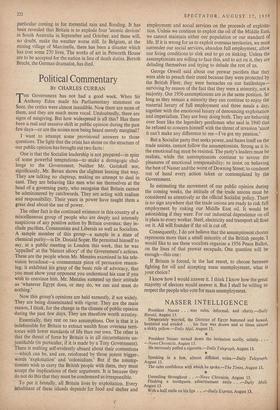Political Commentary
BY CHARLES CURRAN THE Government has not had a good week. When Sir Anthony Eden made his Parliamentary statement on Suez, the critics were almost inaudible. Now there are more of them, and they are much more vocal. Undoubtedly, there are signs of misgiving. But how widespread is all this? Has there been a real and massive shift in public opinion during the past few days—or are the noises now being heard merely marginal?
I want to attempt some provisional answers to those questions. The light that the crisis has shone on the structure of our public opinion has brought out two facts : One is that the Socialist leadership is not prepared—in spite of some powerful temptations—to make a demagogic chal- lenge to the Government. Neither Mr. Gaitskell nor, significantly, Mr. Bevan shows the slightest leaning that way. They are talking no claptrap, making no attempt to deal in cant. They are behaving like men who see themselves at the head of a governing party, who recognise that Britain cannot be administered by catchwords. They are acting with realism and responsibility. Their years in power have taught them a great deal about the use of power.
The other fact is the continued existence in this country of a miscellaneous group of people who are deeply and intensely suspicious of any positive action by Britain overseas; they in- clude pacifists, Communists and Liberals as well as Socialists. A sample member of this group—a sample in a state of chemical purity—is Dr. Donald Soper. He permitted himself to say, at a public meeting in London this week, that he was `appalled' at the 'blatant idiocy' of the Government's actions. These are the people whom Mr. Menzies examined in his tele- vision broadcast—a consummate piece of persuasive reason- ing; it exhibited his grasp of the basic rule of advocacy, that you must show your opponent you understand his case if you wish to convince him. Mr. Menzies summed up their attitude as 'whatever Egypt does, or may do, we can and must do nothing.'
Now this group's opinions are held earnestly, if not widely. They are being disseminated with vigour. They are the main reason, I think, for the change in the climate of public opinion during the past few days. They are therefore worth scrutiny.
Essentially, they rest on two assumptions. One is that it is indefensible for Britain to extract wealth from overseas terri- tories with lower standards of life than our own. The other is that the threat of force by Britain is in all circumstances un- justifiable (in particular, if it is made by a Tory Government). There is nothing self-evidently absurd about their contentions —which can be, and are, reinforced by those potent trigger- words 'exploitation' and 'colonialism.' But if the assump- tionists wish to carry the British people with them, they must accept the implications of their arguments. It is because they do not do this that they must be condemned as irresponsible.
To put it brutally, all Britain lives by exploitation. Every inhabitant of these islands depends for food and shelter and employment and social services on the proceeds of exploita- tion. Unless we continue to exploit the oil of the Middle East, we cannot maintain either our population or our standard of life. If it is wrong for us to exploit overseas territories, we must surrender our social services, abandon full employment, allow our living conditions to sink and to go on sinking. Unless the assumptionists are willing to face this, and to act on it, they are deluding themselves and trying to delude the rest of us.
George Orwell said about our prewar pacifists that they were able to preach their creed because they were protected by the British Fleet; they were barnacles on our battleships— surviving by reason of the fact that they were a minority, not a majority. Our 1956 assumptionists are in the same position. So long as they remain a minority they can continue to enjoy the material luxury of full employment and three meals a day, together with the emotional luxury of denouncing exploitation and imperialism. They are busy doing both. They are behaving over Suez like the legendary gentleman who said in 1940 that he refused to concern himself with the threat of invasion 'since it can't make any difference to me—I've got my pension.'
But a Socialist party that seeks power, and bases itself on the trade unions, cannot follow the assumptionists. Strong as it is, the emotional tug must be resisted. The party's leaders must be realists, while the assumptionists continue to savour the pleasures of emotional irresponsibility; to insist on believing the best of Nasser and the worst of Downing Street; to condemn out of hand every action taken or contemplated by the Government.
In estimating the movement of our public opinion during the coming weeks, the attitude of the trade unions must be considered as attentively as the official Socialist policy. There is no sign anywhere that the trade unions are ready to risk full employment by risking our Middle East oil. It would be astonishing if they were. For our industrial dependence on oil is plain to every worker. Steel, electricity and transport all float on it. All will founder if the oil is cut off.
Consequently, I do not believe that the assumptionist chorus represents more than a small minority of the British people. I would like to see these vocalists organise a 1956 Peace Ballot, on the lines of that prewar escapade. One question will be enough—this one : If Britain is forced, in the last resort, to choose between fighting for oil and accepting mass unemployment, what is your choice?
I know how I would answer it. I think I know how the great majority of electors would answer it. But I shall be willing to respect the people who vote for mass unemployment.


































 Previous page
Previous page